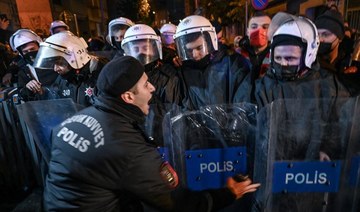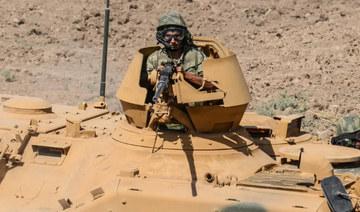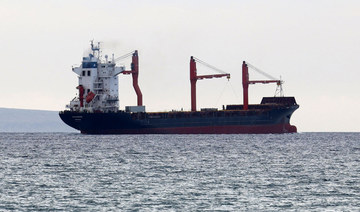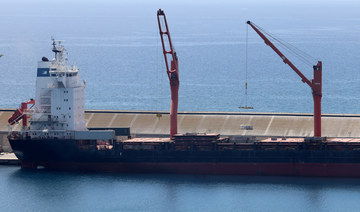ANKARA: Turkey’s migration management policy has become a hot topic in recent days, with members of the public asking for stricter security measures against irregular inflows.
The growing hostility toward refugees has not only been triggered by a worsening economic situation in Turkey, but also following a series of recent incidents.
The memories are still fresh following protests in Ankara last August against houses and workplaces owned by Syrians, following reports that a Syrian refugee stabbed two Turkish men in a fight.
Amid widespread criticism from opposition parties that want refugees deported, Turkish President Recep Tayyip Erdogan said on Wednesday that Syrian refugees would voluntarily return to their country once peace is established in Syria.
According to Prof. Murat Erdogan of Ankara University, 85 percent of Turks want Syrians to be repatriated or to be isolated in camps or safe zones.
There is also an ongoing debate in Turkey about whether to allow Syrian refugees to return if they are able to briefly visit their homeland during the upcoming Eid al-Fitr holiday.
The Turkish government is currently working on a plan to restrict the passages during Ramadan, discouraging many Syrians from leaving over fears they may not be allowed back into Turkey.
“Irregular migration is an unnamed invasion,” said the leader of the Nationalist Movement Party, Devlet Bahceli, the coalition partner of the ruling government.
The topic, which gained momentum after the recent arrival of about 60,000 Ukrainian refugees to Turkey, has been promoted by anti-immigrant parties, such as the Zafer Party, who have said they will send all refugees back to their home countries after 2023 elections.
“Turkey is indeed bound by international law of non-refoulement, which prohibits the return of anyone to a place where they would be at risk, and this principle is also protected by the national laws including the temporary protection offered to Syrians,” Begum Basdas, researcher at the Centre for Fundamental Rights at the Hertie School in Berlin, told Arab News.
Turkey hosts about 3.7 million Syrians. Turkish Interior Minister Suleyman Soylu recently announced that some 500,000 have returned to safe areas created in northern Syria after Turkey’s cross-border operations, and more than 19,000 Syrians have been deported since 2016 for breaking the law.
Opinion
This section contains relevant reference points, placed in (Opinion field)
“Treating migrants as bargaining chips by states is nothing new, but what is worrisome today is that the public is also in on the ‘game.’ We must recognize that Turkey hosts the largest number of refugees in the world, and this is a strength, not a burden,” said Basdas.
Turkey has awarded citizenship to 192,000 Syrians so far, but the opposition has also asked for more security checks in granting citizenship, as they claim some criminals use it to cross over Turkey’s borders.
Ahead of the upcoming elections in 2023, the main opposition Republican People’s Party pledged to send Syrian migrants back to their countries, and reconcile with the Assad regime to ease the return of Syrian nationals.
Friedrich Puttmann, a researcher at the Istanbul Policy Center, said the reasons why most Turks today reject Syrian refugees are diverse, including economic, social and political reasons.
“Economically, many Turks perceive the Syrians to be the cause of rising rental prices and Turkish citizens’ joblessness. That is because one third of the Turkish economy is informal and most Syrians work informally too, however, most of the time for lower wages than Turks. For many Turks, this the reason why they can’t find work anymore,” he told Arab News.
“Moreover, many Turks tend to believe that the Turkish state privileges Syrians by not collecting taxes on their entrepreneurial activity, giving them privileged access to health care and education, and paying them welfare benefits that are not available for Turks. Most Turks don’t know that the latter two are mostly financed by the EU in fact. However, the seeming injustice this creates in the eyes of Turkish citizens upsets many of them,” he added.
According to Puttmann, Turks’ attitudes toward Syrian refugees also have a political dimension, which mirrors Turkey’s internal struggles over national identity.
“On the surface, many secular Turks reject Syrians for being too religiously conservative whereas many religiously conservative Turks reject Syrians for not behaving like ‘proper Muslims.’ Under the surface, both criticisms are expressions of how different Turks would like to see their country and are therefore more directed at Turkish society in general than at the Syrian refugees in particular,” he said.
Puttmann also thinks that, with the omnipresence of nationalism, most Turks come together in fearing that Syrians will not adapt to Turkish society and one day will outnumber them.
But, the voluntary return of Syrian refugees to their homeland remains unlikely, as the present conditions in Syria are still not conducive for them to rebuilding a life.
“Many Syrians have lost all they had, fear Assad, and their children may have grown up more in Turkey than Syria by now. This means that no matter how many Syrians will eventually return to Syria, a certain number will most likely stay in Turkey forever,” Puttmann said.
According to experts, Turkish authorities should work on sustainable solutions, like resettlement to third countries, for sharing responsibilities with the international community.
For Basdas, it is not possible to “open the gates to Europe for refugees” or “send them back to Syria in buses.”
She said: “Such electoral wishful promises are not soothing to anyone, but fuel further anti-refugee sentiments and racism in Turkey and provokes the public to the route of pogroms and violence. There is no return from there.”
Puttmann agrees and said that there is a need for a pro-active nationwide integration strategy to fully fit Syrians into local society.
“First, Turkish society should formulate what it expects of Syrian refugees to be integrated, taking into consideration the refugees’ rights and own expectations as well.
“Second, Turkey should come up with a plan of how to get there.
“Third, the EU should support this process with expertise and financial aid, as solving the refugee issue in Turkey is also in the EU’s vital interest.”





























